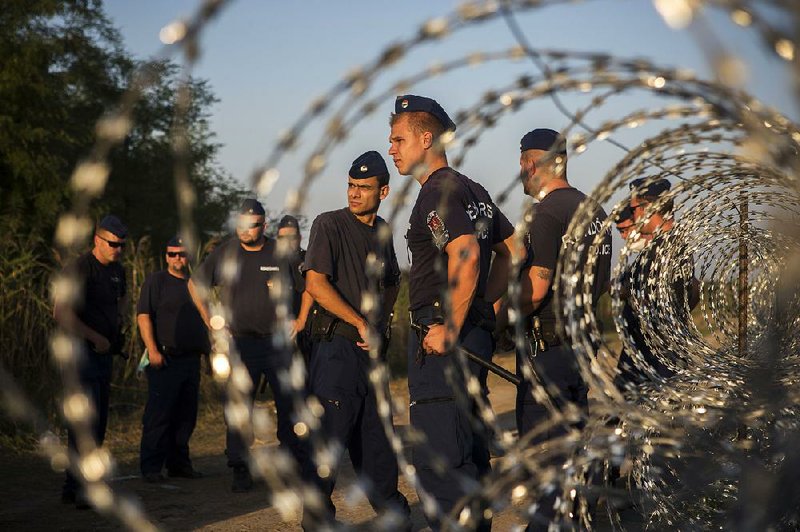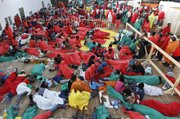BUDAPEST, Hungary -- Hundreds of frustrated migrants demanding passage to Germany jostled with riot police beside Budapest's main international train station Wednesday as Hungary spent a second day trying to keep thousands of asylum-seekers from spilling deeper into Europe.
Scores of officers pushed back the crowd of people, who shouted in Arabic and English to be permitted to march around the Keleti train station, which has become the latest focal point for European tensions over a flood of migrants from the Middle East, Asia and Africa.
Tempers also flared along Hungary's border with Serbia as rightist nationalist protesters marched to the location where migrants use a train track to walk into the country. Police formed protective circles around migrants as demonstrators from the far-right Jobbik party shouted at them.
The 28-nation European Union has been at odds for months on how to deal with the influx of more than 332,000 migrants so far this year. Such front-line nations as Greece, Italy and Hungary have pleaded for more help, while Germany, which is expecting to receive an EU-leading 800,000 asylum-seekers this year, has appealed for EU partners to bear more of the load.
"We have to reinstate law and order at the borders of the European Union, including the border with Serbia," Hungarian government spokesman Zoltan Kovacs said. "Without re-establishing law and order, it will be impossible to handle the influx of migrants."
He said Hungary's prime minister, Viktor Orban, will take a "clear and obvious message" to a meeting today with EU chiefs in Brussels about migrants.
At Hungary's border with Serbia, about 300 protesters led by Jobbik party leaders waved Hungarian and party flags as they marched to the border crossing and shouted at the frightened migrants -- many of whom had just completed a day-long hike along the rail line -- to go back to their homelands.
"I am a mother, I am Hungarian, this is Hungary, and they have to go home," said 57-year-old protester Aniko Cserep.
Hungary's police reinforced their positions outside the Keleti terminal as the volume of migrants arriving from Serbia grew, with an estimated 3,000 already encamped near the station. Officers working with colleagues from Austria, Germany and Slovakia were searching for migrants traveling on Hungarian trains.
The clampdown on train travel from Budapest has had an immediate effect in the migrants' primary target country, Germany. German police reported Wednesday that only about 50 migrants arrived on the morning trains to Munich, compared with 2,400 Tuesday.
The Czech Republic announced Wednesday that it no longer intended to prevent Syrians who had already claimed asylum in Hungary from traveling via its territory to Germany. The Czechs previously had detained Syrian migrants, as well as those from other nations, for up to 42 days.
Czech police spokesman Katerina Rendlova said the decision was prompted by Hungary's refusal to accept such migrants and by Germany's declaration not to return them.
Elsewhere, 13 people died when two small boats ferrying them from Turkey to the Greek island of Kos capsized. Turkish media said 12 drowned, including a woman and three children, while another person died later in a hospital.
The Greek coast guard said it had rescued 1,058 people in 28 Aegean Sea locations over the previous 24 hours. More than 200,000 migrants have reached Greece this year, chiefly from neighboring Turkey, where more than 1 million live in refugee camps because of warfare in Syria, Iraq and Afghanistan.
Greek police also arrested six suspected smugglers in northern Greece after finding 103 migrants, including 19 children, hidden in a truck.
In France, cross-Channel trains resumed normal service Wednesday after overnight disruptions triggered by reports of migrants running on the tracks and trying to climb atop trains. Hundreds of Eurostar train passengers had been stranded in France and the United Kingdom.
Eurotunnel, which operates the Channel Tunnel and freight trains that carry trucks and other vehicles under the channel, said the tunnel itself wasn't blocked. Spokesman Anne-Laure Descleves said the track trespassing occurred outside the rail network that its trains use.
Passengers aboard one Paris-to-London train had said their service was suspended because migrants trying to climb aboard the train had damaged fire-safety equipment.
In Austria, 24 Afghans locked inside a van were discovered Tuesday after a nighttime police chase on highways on the outskirts of Vienna, police said.
Police spokesman Thomas Keiblinger said the truck's rear doors had been padlocked to keep the Afghan men, ages 16-20, trapped inside, and the windows were sealed to prevent fresh air from getting inside the container. He said those inside were freed in good health because they had spent relatively little time inside.
Officers noticed the van during patrols, Keiblinger said. The vehicle was forced off a highway and onto a Vienna street, where the driver eventually stopped and fled on foot before being arrested at a shopping center, Keiblinger said. Police continued to interrogate the driver, a 30-year-old Romanian.
In other news, Slovakia's foreign minister said the flood of migrants crossing Europe could unite the far right in his country, calling it a "scary" prospect.
He said the far right was telling people, "'We will protect you from migrants,' and people will vote for them. We are not a laboratory, we are real countries, real societies." He called for a "very open, a very rational, a very deep, substantial discussion" on how Europe is going to deal with these issues.
Information for this article was contributed by Bela Szandelszky, Amer Cohadzic, Geir Moulson, George Jahn, Suzan Fraser, Elena Becatoros, Angela Charlton and Alison Mutler of The Associated Press; and by Alison Smale of The New York Times.
A Section on 09/03/2015


